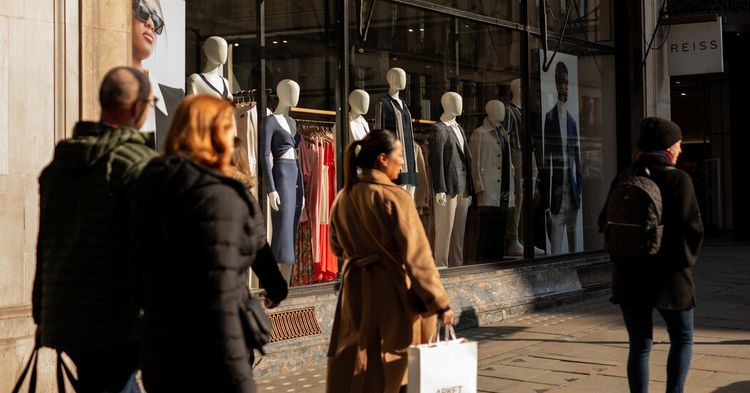UK Inflation Jumps Up to 10.4 Percent

The cost of goods and services in the United Kingdom has increased by 10.4 percent from February of the previous year, marking a shift from the previous trend of declining prices.
On the 22nd of March in 2023, the blog section was updated at 8:16 a.m. Eastern Time.
Surprisingly, the inflation rate in Britain increased last month, going against the previously observed decline trend, which may have an impact on the anticipation that the Bank of England would soon cease rising interest rates.
The Office for National Statistics reported that consumer prices in the UK increased by 10.4% in February when compared to the same period last year. Prior to this, the rate had slowed for three months in a row, falling to 10.1% in January following a peak in October of 11.1%- the highest in over 40 years. Thursday will see the Bank of England's rate-setters disclose their next policy decision.
In February, the cost of things went up by 1%. This was the largest increase from one month to the next since October. The main reason for this was that restaurants and hotels started charging more. Also, the cost of alcohol went up in pubs after being discounted in January. The agency that gives out statistics says that food prices also went up more quickly. In January, the annual rate of increase was 16.7%, but in February it was 18%.
The chief economist at the statistics agency, Grant Fitzner, stated that the cost of food and non-alcoholic beverages have reached their peak in more than 45 years. There has been a significant rise in the prices of certain salad and vegetable products due to escalated energy costs and unfavorable weather conditions in some parts of Europe, which has caused a scarcity and rationing of such products.
The increase in inflation is bad news for people in the UK struggling to afford their daily expenses. High costs for utilities, slow wage growth and expensive necessities like food have all played a part in making life harder. In fact, the Office for Budget Responsibility recently said that household income has dropped more than it has in over 60 years, when adjusting for inflation.
Despite the decline in wholesale energy prices, which was the main cause of inflation last year, the central bank has refrained from claiming success in its efforts to combat inflation.
In December 2021, the Bank of England made the decision to be the first of the big central banks to raise interest rates. This was in response to the steep increase in energy prices at that time. The central bank has continued to raise rates since then, with an increase of almost 4 percentage points. This move is intended to prevent inflation from remaining at a consistently high level in the economy. Policy makers have carefully monitored the rise in prices for services and indications that wages in the private sector are increasing rapidly. These factors would make it challenging to bring inflation back down to the bank's target of 2 percent.
Analysts had recently speculated that the Bank of England may become the initial major central bank to cease raising interest rates. According to the bank's forecasts, inflation is anticipated to significantly decelerate this year, with a yearly rate of only 4 percent projected by the year's conclusion.
In the previous month, Andrew Bailey, the person in charge of the central bank, mentioned how there had been progress with inflation, but he wanted to mention that it was still too soon to know for sure and that there were still risks. Nonetheless, leaders in charge of policies have shifted their way of talking about what's going to happen with interest rates. They chose to drop the idea that the rates would only become higher, and instead added “if there were to be evidence of more persistent pressures, then further tightening in monetary policy would be required,” as they discussed during their February meeting.
The information published on Wednesday proves that predicting inflation is still difficult. The yearly core inflation percentage, which disregards unpredictable energy and food costs and is used to assess the roots of inflation in the economy, increased from 5.8 percent in January to 6.2 percent last month. Additionally, the rate of services inflation rose from 6 percent in January to 6.6 percent.
This contradicts a previous data release that may have eased the concerns of policymakers. The previous data indicated a decline in the rate of wage growth, marking the first slowdown since the end of 2021. According to the statistical agency, employees' salaries, not including bonuses, increased by 6.5% on an annual basis in the three months leading up to January. This is a decrease from the 6.7% increase reported in the three months preceding December.
Many traders speculate that central banks are reaching their maximum interest rates as inflation seems to have reached its highest point in several significant economies. Recently, the Bank of Canada decided to maintain its interest rate at 4.5 percent, which was the first time it didn't raise rates since January 2022.
Afterwards, there has been a lot of trouble with banks in the United States. The collapse of Silicon Valley Bank has made it difficult for central bankers to make decisions. These problems in the bank industry have made policymakers more careful about raising rates too high. They don't want to risk making a bigger crisis in the banks.
On Wednesday, the Federal Reserve of the United States is going to decide on setting the interest rates. However, there is no consensus among analysts as to whether they will keep increasing it or not.













































